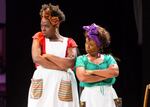
Joseph Gibson plays the playwright Branden Jacobs-Jenkins, who writes himself into his retelling of the historic play "The Octoroon" and dons white face when he can't get white actors to take on the racist roles.
Russell J. Young
Many regional theaters follow a rough formula when they put together their seasons: open with something big and well-known, balance provocative dramas with comedies and musicals, sprinkle in a couple recent Tony-winners and world premieres, and go out with a bang — preferably with lots of singing.
It's a formula that Artists Repertory Theatre artistic director Dámaso Rodriguez has decided to totally abandon this year.
"In the months leading up to the election, as we were programming, I was still looking for these tent pole productions — those familiar titles you can bring your whole family to that are a gateway drug to other work," he said. "With the election, it just upped the stakes: What are we trying to do? Why are we here? And we wanted to just do a season of plays that are really wrestling with the anxiety of our times."

Artists Rep's artistic director Damaso Rodriguez
Shawn Lee
Rodriguez figured there were two ways to go after the election: produce shows that provide escape and release, or produce shows that directly confront what's going on in this moment in America and spark reflection and conversation.
Calling back to the theater's 35-year-old mission statement to be provocative, he went with the latter. "It would feel false to do otherwise," he said.
So Rodriguez chose to program plays entirely by playwrights of color and women, including two world premieres ("Megallanica" and "The Thanksgiving Play"); the opening shocker, "An Octoroon"; and the Northwest premiere of the recent Tony-winner, "The Humans" — a coup for a theater of Artists Rep's size.
Here are highlights from the extended interview with Rodriguez about the provocative, risky season. You can also find an shortened interview in the Sept. 23 "State of Wonder" episode 7 minutes and 50 seconds into the show.

Playing the roles of two house slaves, Andrea Vernae and Jocelyn Seid enter the stage with protest signs that say "I don't know what a slave sounded like and neither do you." Throughout the course of the play, their language switches from modern day vernacular when they're alone to the romanticized vernacular of slaves when they're around white masters.
Russell J Young
On "An Octoroon" by Brandon Jacob-Jenkins, running Sept. 3–Oct. 1
Dámaso Rodriguez: It is one of the most controversial, challenging, and difficult pieces of theater to have come out in a long time. It's a play from 2014, and it's confronting the racist heritage in America and even the racist heritage in the theater. This young African-American playwright, Brandon Jacob-Jenkins, has written himself as a character into a radical adaptation and deconstruction of "The Octoroon," an 1859, very popular play set on a plantation in Louisiana.
The conventional wisdom is to launch the season with a big, warm play that gets things off in a way that’s easier and builds an audience, and this is trying to create a little more of an electric, dangerous theater experience to get people talking.
On "Caught" by Christopher Chan, running Oct. 1–Oct. 29
Rodriguez: "Caught" is a combination of a visual art installation that will begin in the lobby of the theater by an artist called Lin Bo. You interact with the art of this Chinese dissident artist and work your way into the theater space, which we have transformed into a gallery that looks exactly like the gallery that you were just walking through in the lobby. And the performance begins with a talk about the art you just saw and then the play takes these unexpected turns that I cannot describe. They really are a fusion of performance art and theater.
It's a play about truth: what's real, what isn’t. It's inspired by the Mike Daisy Steve Jobs Agony and Ecstasy monologue about the conditions in a Chinese factory for Apple. And what was revealed was that he was presenting certain ideas as his own that were actually compilations of other experiences. So Christopher Chen started with that impulse, and the play is fascinating.
On "Magellanica" by E.M. Lewis, running Jan. 20–Feb. 18
Rodriguez: Then the other big gamble — not necessarily because it's so controversial, although it is a play that deals with climate change — is called “Magellanica,” and it's by an Oregon-based playwright named E. M. Lewis. She has written a five-part, epic play that's going to run six hours with a dinner break where the audience will eat onsite at the theater together.
It’s centered around a winter expedition in Antarctica at a science station where they're studying what may be a hole in the ozone layer in 1985. There is a Russian climatologist, American, Norwegian, Bulgarian, there is a Chinese-American studying glaciers, so you’ve got these eight people living together in a place that is arguably more remote than space, because when you winter in Antarctica, you cannot go in or out for eight-and-a-half months.
It is kind of a pressure cooker scenario where you have all these people from different parts of the world all kind of escaping something, living together. And it's in the tradition of these epic pieces of theater like "Angels of America," where you experience Part One and Part Two together on the same day, or you experience that in opera from time to time, and certainly we’re all binge watching in the same fashion or TV shows at home. So we want you to come to the theater and come on this journey and really unplug for several hours.
